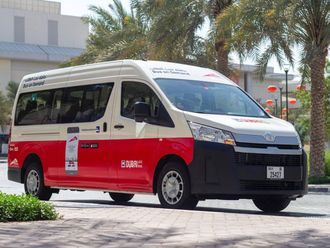Dubai: Motorists misusing the dedicated bus and taxi lanes will start getting fines of Dh600 from April 1 through smart cameras installed by the Roads and Transport Authority (RTA).
The new smart system, known as Al Masar, was introduced as a trial three months ago on Naif Street, where any misuse of the 1.7-km-long dedicated bus lane would result in an SMS warning being sent to the motorist.
However, the trial period ends this month and instead of sending warning messages to violating motorists, the system will now issue immediate fines of Dh600 with every violation on the dedicated bus lane.
“We have installed seven cameras along the 1.7km dedicated bus lane on Naif Street. The cameras are equipped with smart systems which can identify the violators accurately,” said Yousuf Al Ali, CEO of RTA’s Public transport Agency.
The system identifies two categories of vehicles — white-listed and black-listed.
“The white-listed ones are RTA buses, taxis, ambulances, civil defence and police vehicles, which are allowed to use the dedicated bus lanes, while all private vehicles are black-listed and will be penalised for use of the dedicated lanes,” added Al Ali.
The new system allows motorists a grace distance of 20 metres for exit and entry from side roads, parking as well as drop off areas.
In the initial phase, the system will be implemented on the Bus and Taxi Only Lane on Naif Road, which is used by 20 routes involving more than 300 public buses per day (about 2,431 journeys per day).
However, he assured that the new surveillance system will soon cover all the dedicated bus lanes across the city.
“The system will be active on Naif Street from April 1, but we will install the cameras on all the lanes in phases. In the meantime, Dubai Police patrols will continue to issue fines whenever they see a violation,” he said.
Highlighting the benefits of the surveillance system, Al Ali said: “The trial phase on Naif Street showed a 63 per cent drop in violations, which shows that more people are aware of it now and our awareness campaign through SMS, press and social media has worked in educating people about the dedicated bus lanes.”
Dr Al Ali said: “
According to RTA, the dedicated bus lanes have helped reduce travel time on buses and encourage people to use public transport.
“It is a proven international practice and we have seen the benefits of having dedicated lanes across various parts of the city, mostly in congested areas. Currently, we are conducting studies to implement the system in more areas of Dubai,” he said.
RTA introduced six kilometres of dedicated bus lanes in Dubai in 2010 on portions of Al Mankhool Street, Al Khaleej Street, Khalid Bin Al Waleed Street and Al Ghubaiba Street.
In 2011, the project covered a section of Naif Street and parts of Ittihad Street in the direction from Sharjah to Dubai near Al Nahda Interchange.
Gulf News asked motorists what they thought about the utility of the new system.
“I don’t think the dedicated bus lanes are helping the cause on Naif street, there are just too many buses and they are everywhere, both on the dedicated lanes as well as on regular lanes. They just don’t give way, and it’d difficult to driver along. With this surveillance system it will be better for buses but it will be even more difficult for motorists,” said Mohammad Imran.
Taxi driver, Furqan Ali believes it’s a good move.
“Naif road is always congested, and most often we see even the dedicated bus and taxi lane is also blocked by motorists, but this system will ensure we get a free way,” said Ali.
However, a bus driver, who wished to remain anonymous, said the dedicated bus lane on Naif street that actually merges with a regular lane at the end, doesn’t serve the purpose.
“There is a bottleneck at the end of the road, where traffic from different directions converge and it’s usually a chaos at that point, when you try to exit on Al Khaleej road. I think until the bottleneck is removed the congestion will remain and it will be harsh to issue such a huge fine on motorists for lane violations,” he said.










